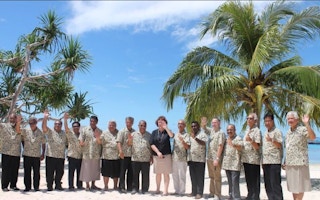The Pacific Islands Forum, the peak regional body of Pacific Island states, met in Majuro, Marshall Islands, last week. A major outcome of the meeting was the Forum Communiqué. This is the blueprint for national and regional initiatives underpinning the social, economic and environmental development of a diverse and complex Pacific region.
The Pacific Islands Forum meeting received wide publicity for adopting The Majuro Declaration for Climate Leadership. This policy states the Pacific Islands are leading the world in action on climate change.
But other pressing matters of national and regional significance didn’t make it onto the development agenda. Management of urbanisation did not rate a mention.
The Pacific urban fabric remains messy and complex. Dysfunctional land markets, increasing ethnic tensions, deteriorating urban security and safety concerns, under-resourced local governments, and disenfranchised customary land owning groups provide a socially rich yet muddy urban tapestry upon which to effect change.
“
Pacific towns and cities have stuttering performance caused by absent and declining infrastructure and other pillars of growth. Despite their condition, they remain vital contributors to gross domestic product (around 50 to 60 per cent of national GDP), city productivity and environmental sustainability
Across the majority of Pacific Island states, tackling urbanisation remains a “no go” area for national level politicians and most regional donor agencies. AusAID, the region’s largest donor, has avoided integrated urban sector based programs and projects since the end of the 1990s.
Important regional organisations, such as the Fiji-based Pacific Islands Forum Secretariat which coordinates the annual Pacific Island Forum (note Australia is a major funder), reflect the same trend.
Pacific urban issues should matter. An Asian Development Bank regional assessment from 2012 indicated that the average urbanisation rate was 43.5 per cent. In 2011, 2.03 million people lived in Pacific urban areas. This accounts for approximately 20 per cent of the total Pacific Island population.
Over half the world’s population now lives in urban areas. Research has shown the paramount contribution of towns and cities to national social, economic and environmental development. They are increasingly the engines of national growth, a key principle that seems lost in the development debate for Pacific Island states.
Pacific towns and cities have stuttering performance caused by absent and declining infrastructure and other pillars of growth. Despite their condition, they remain vital contributors to gross domestic product (around 50 to 60 per cent of national GDP), city productivity and environmental sustainability. And they make an adverse contribution to climate change.
New settlers to Pacific towns and cities are increasingly saying that surviving in urban poverty is a better option than living in rural poverty. Escalating squatter, informal and other types of settlements accompanied by rising urban poverty levels will figure prominently as one the Pacific’s major development challenges in the next decade.
These informal settlements are most common in the Pacific sub-region of Melanesia. In Port Moresby, for example, more than half of the estimated city population of 750,000 people live in informal settlements. Day-to-day survival is the primary concern. Similar trends (though at lower and varying degrees) exist across all Pacific towns and cities including Suva, Nadi, Honiara, Port Vila and Apia.
The Australian aid program is a multimillion-dollar business. In the past few years, the Pacific Region has received about 25 per cent of the total aid budget. The bulk of some A$400-plus million goes annually to Papua New Guinea. With many small island states needing long term propping up with development assistance, asking where and how Australian tax payer’s money is being spent is a key policy issue.
Having Port Moresby continually rated amongst the world’s worst city – in August 2013, it was rated the world’s third worst city after Damascus (last) and Dhaka – should be sending a loud and clear message that urban development does matter.
This is more so in the light of the new Abbot-led Australian government. It will rightly scrutinise the effectiveness and sustainability of aid funding, including for Pacific-based climate change programs. Many people – including those who have the least opportunity to have their voice heard in the Pacific Region – will be hoping the urban sector will figure in the revised development agenda. Most will be hoping for more grass roots local and city level programs that can be scaled up and replicated.
Interventions based around formal government channels, often at the national level, need to recognise that the city is increasingly built by informal governance arrangements. Urban dwellers are becoming marginalised and having to source their own water, power, land and housing in the growing mass of squatter and informal settlements.
There is a myriad of informal urban governance arrangements meeting their day-to-day needs. Formal government systems and processes need to confront the reality that in Pacific towns and cities there can’t be a “one size fits all” approach to aid.
It is somewhat ironic that the Forum Communiqué – and especially the Majuro Declaration for Climate Leadership – is premised on providing leadership to the world on climate change. The climate change declaration contains a list of measures to which the 15 member countries are committed.
But elevating leadership on the condition and state of Pacific towns and cities – including linking urban growth to climate change and sea level rise and deteriorating levels of urban infrastructure, livelihoods, water quality and land degradation – remains conspicuously absent from the agenda of the region’s peak political body.
Understanding the why and how of divided cities in the Pacific region is long overdue for serious attention. If we continue to marginalise the issue, then those that most need to be heard in a complex web of formal and informal urban governance arrangements, namely, the vulnerable and those in hardship in growing squatter and informal settlements, will remain stranded in the Pacific urban milieu.










